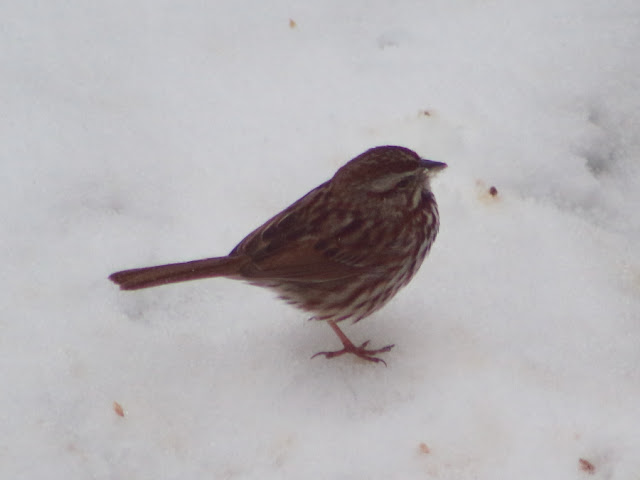 |
| Dark-eyed junco (Junco hyemalis) I find it's one of the hardest birds to photograph, especially on a dreary day |
It was unusual for me not to see any of these little "snow birds" around this winter; they must have traveled to other climes which had better food sources for them. The first flock arrived on a cold snowy morning, followed shortly by mixed flocks of sparrows and finches making their appearance.
 |
| A common redpoll |
Even without the bird feeders in place and after raking as much of the seed from the ground as possible these specialist in small seeds found plenty to keep them busy.
 |
| A couple of redpolls share the leftovers |
The nuthatches are far too demanding of their large seeds and nuts to bother with little millet seeds down on the ground. And it was sad to see the wood peckers come by looking for their usual feeding stations, circling around trees and posts wondering what happened to the easy pickings. One of the less common birds I see, the common redpoll (an oxymoron there?) was in the flock.
 |
| Common Redpoll (Acanthis flammea) |
 |
| A distinguishing feature of the redpoll is its black face |
Just because I don't see them often doesn't mean they aren't numerous. Estimates of the redpoll population is in the tens of millions, all located in the far northern latitudes. Though not a finch, they are in the same family as finches and share many of the same characteristics including the preference for tiny seeds as fits their small beak. Studies have shown that during the winter their diet consists of almost entirely birch seeds. [REF: Cornell Lab of Ornithology]
Other members of the flock include the very common Song Sparrow, which in a few weeks will be serenading us with its melodious song on warm spring mornings.
 |
| The song sparrow (Melospiza melodia) lives up to its name |
We did suffer a set back on those elusive summer mornings this week when a coastal storm brought in some cold weather and an inch or two of wet, soggy snow.
 |
| April showers, New England style |
But it won't last long, and we're already back to opening up larger bits of lake to attract more migrants to our lake, including, soon, we hope, our loons!
 |
| More open water will attract beavers and ducks soon, and the loons won't be far behind. |

No comments:
Post a Comment